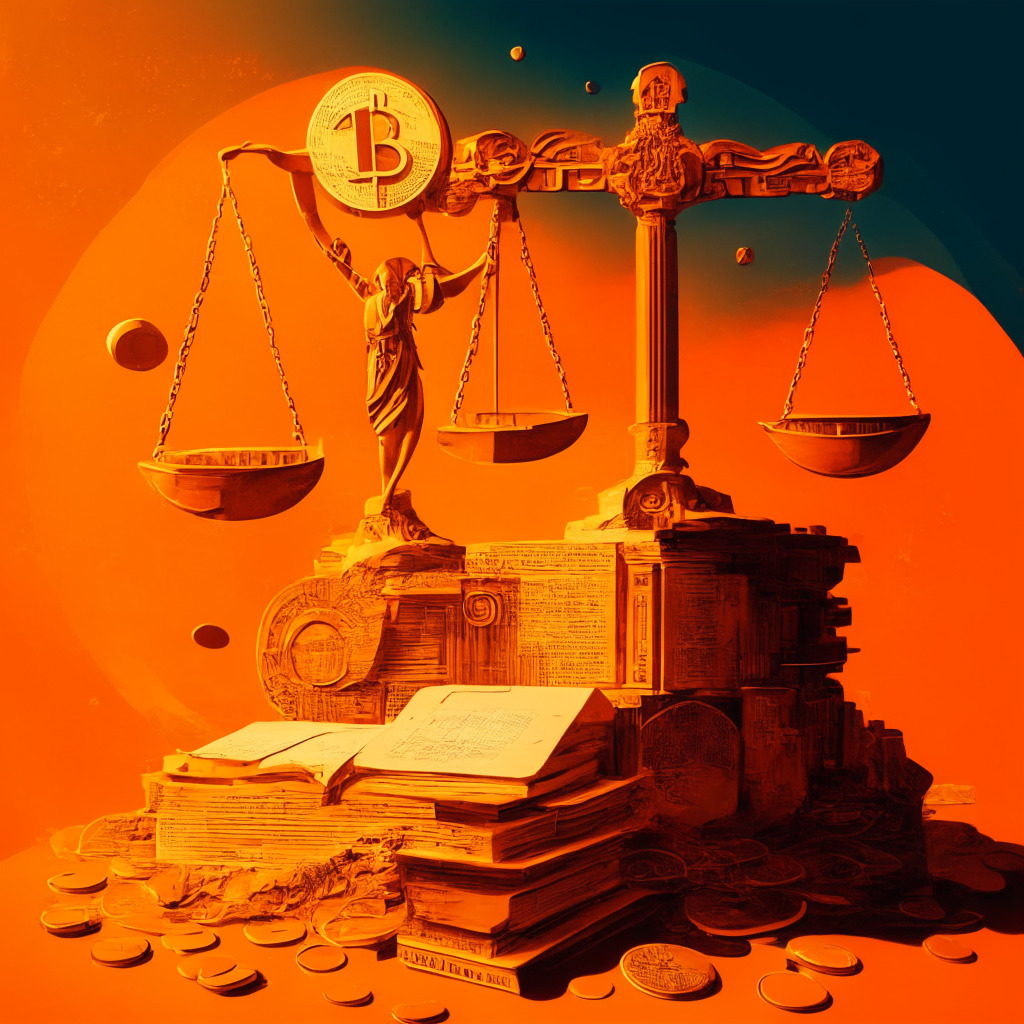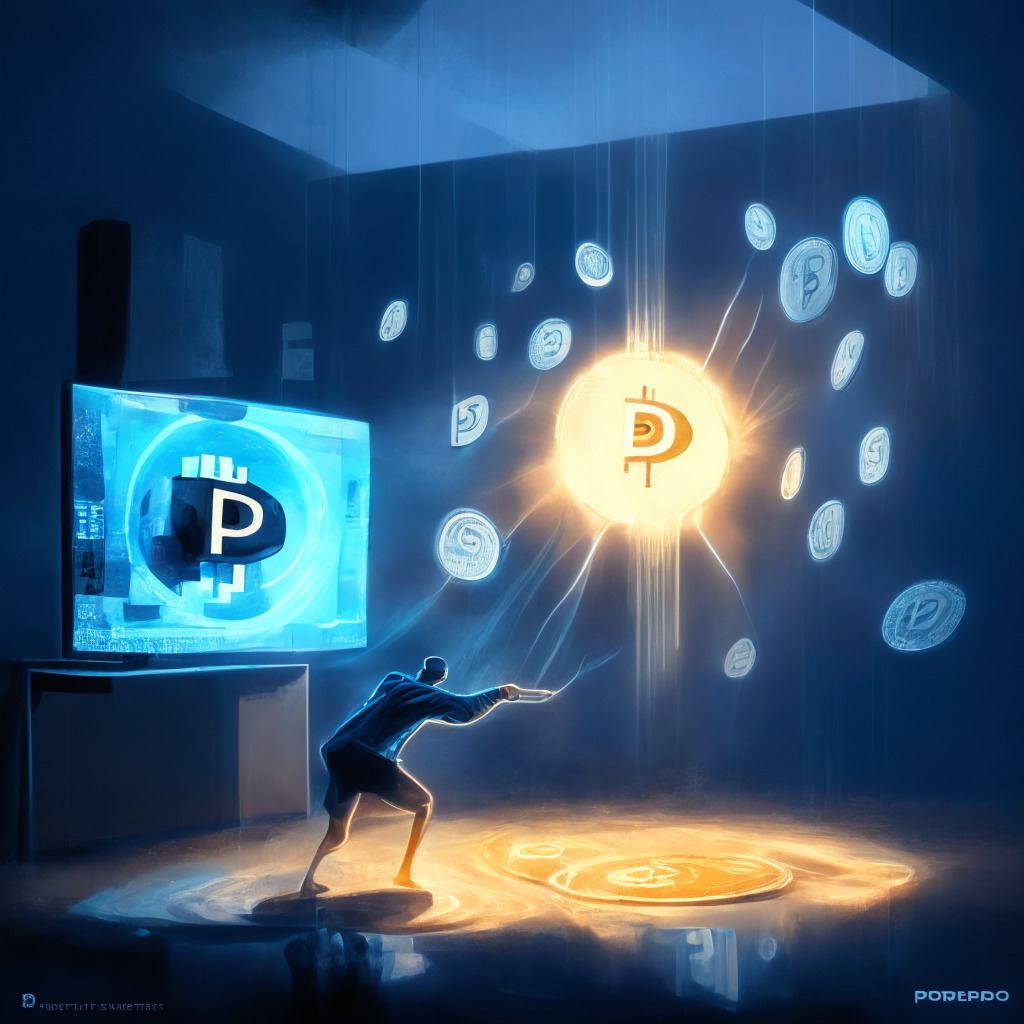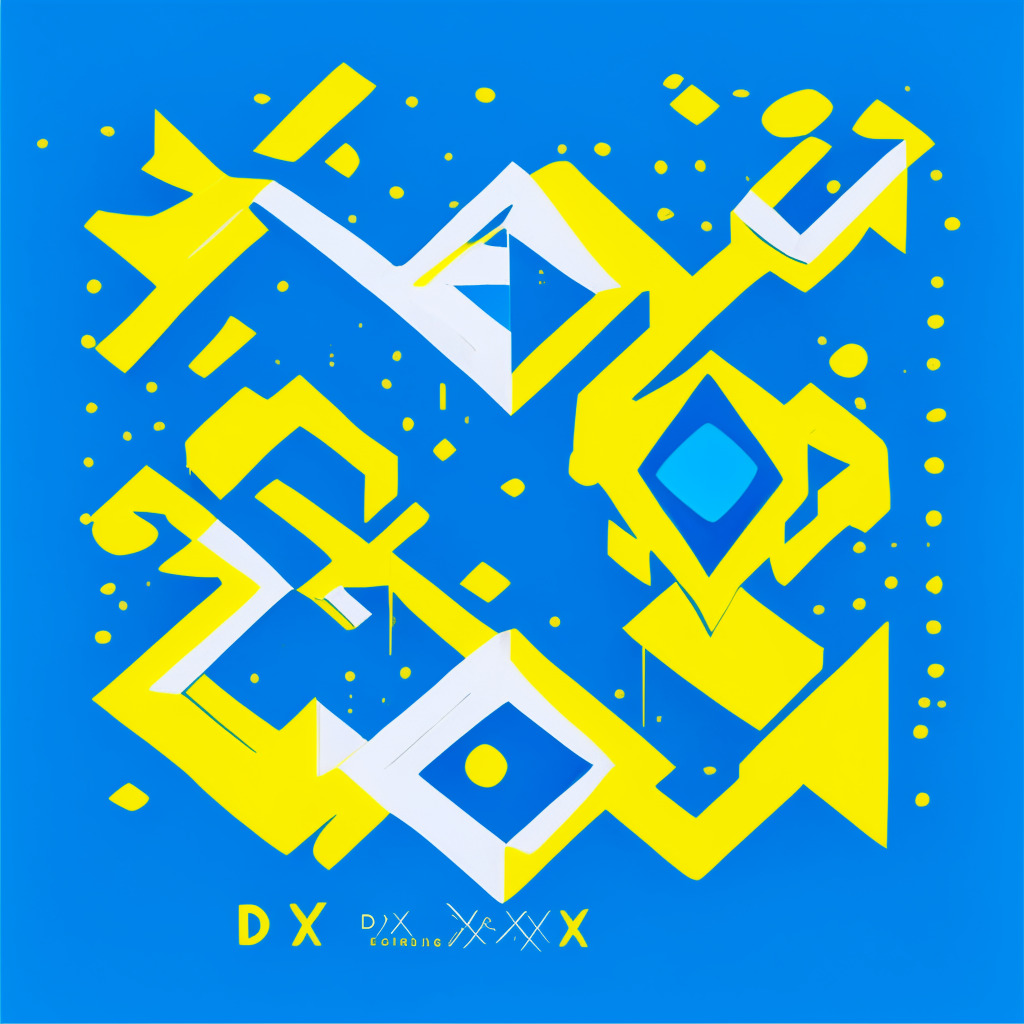Cryptocurrencies CAKE, INJ, WMS, Ecoterra, Mask, yPredict, and QNT are gaining investors’ attention due to their unique features and potential for growth. PancakeSwap offers a farming feature, Injective focuses on decentralized finance, and Ecoterra promotes recycling while yPredict leverages AI technology.
Search Results for: Mask Network
Unmasking Blockchain Immutability: A Dive into Accountability and Trust
Blockchains are not inherently immutable; rather, they offer accountability and trust. While past transactions remain unchangeable, balances and smart contract codes can be updated. The real value lies in ensuring any executed or altered element is specified, fostering transparency and security in applications requiring human collaboration and money management systems.
MetaMask and PayPal Join Forces: Revolutionizing Crypto Accessibility in the US and Beyond
The collaboration between MetaMask and PayPal enables American users to buy ETH and transfer it between the platforms, making cryptocurrency more accessible. This partnership expands PayPal’s crypto assets and introduces the “Buy Crypto” feature within MetaMask, reflecting an exciting future for blockchain technology and crypto markets.
OKX Transfers $60M to Alameda Research: Implications for Crypto’s Road to Recovery
OKX, a top digital asset exchange platform, recently transferred $60 million worth of USDT and MASK tokens to Alameda Research, aiming to return about $157 million to Alameda and FTX. This move demonstrates OKX’s dedication to making amends following the collapse of FTX exchange and Alameda Research’s bankruptcy due to unauthorized transactions and misappropriation of funds.
OKX Transfers $60M to Defunct Hedge Fund Alameda: Repaying FTX Creditors or More to Uncover?
OKX crypto exchange reportedly transferred $60 million worth of digital assets to defunct hedge fund Alameda Research’s wallets, raising questions in the crypto community. This transfer may be part of a restitution effort to repay creditors of FTX, Alameda’s sister company.
Blockchain Blemishes: South American Cybercrime Investigation Unravels Crypto’s Double-Edged Sword
“This story embodies the complexities of the blockchain era: a vortex of opportunities and challenges swirling together. Secure online transactions and financial autonomy are laudable, but the obfuscation and veil of anonymity may inadvertently shield devious individuals, unfurling a global chase through digital footprints across international borders.”
Binance in the Crosshairs of Cybercrime: A Case Study in Blockchain-based Law Enforcement
“Binance, a major player in the crypto world is leading the fight against cybercrime, using blockchain technology to ensure user security. Recently, Binance partnered with CCIB and Thailand’s Royal Police, successfully dismantling significant scams and seizing assets worth millions.”
PayPal and Franklin Templeton Diving Deeper into Crypto: Risks and Rewards Ahead
“PayPal and Franklin Templeton are venturing deeper into the crypto sphere, with PayPal introducing crypto on- and off-ramps, and collaborations like its partnership with MetaMask. Franklin Templeton is seeking Bitcoin ETF approval, reflecting growing mainstream acceptance of digital assets.”
Unraveling the Paxos Mystery: Missteps, Controversy, and the $500,000 BTC Fee Conundrum
Paxos, a US-based crypto service provider, made an odd transaction, sending $200 worth of BTC but tagging an astounding fee around $500,000 due to a bug. This incident drew attention to the unpredictability of digital currencies and triggered discussion on improved safety protocols.
Regulatory Scrutiny vs Technological Advancements: Navigating the Complex Crypto Landscape
Despite regulatory challenges and hacking threats, the crypto sphere continues to innovate, with enhanced privacy, user experience, and transaction efficiency. As Ethereum plans a major transformation and Ripple maintains its legal standing, the tokenized assets market could reach $16 billion by 2030. However, effective regulation remains vital to safeguard all stakeholders.
PayPal’s Crypto Integration and Binance’s Noble Deed: A Deep Dive into Pros, Cons & Verifiable Progress
“PayPal’s new feature allows U.S. users to convert cryptocurrencies to USD. However, this poses questions due to transaction costs, potential incompatibility with MetaMask, and Bitcoin transactions. Meanwhile, Binance’s generous disaster relief pledge raises issues regarding beneficiary verification.”
The Evolution of Cross-Chain Interoperability: A Game-Changer or a Destined Failure?
“Blockchain networks may face growth obstacles due to “chain tribalism”, resistance to cross-chain collaboration. However, a shift towards chain interoperability, or different blockchains interacting, is expected by 2023. Notable upcoming developments aim to enhance this interoperability, although existing methods risk security breaches and require improvement.”
dYdX’s Bold Leap: Migrating from Ethereum to Cosmos with Decentralized Order Books
“dYdX is introducing decentralized order books to their platform and is shifting from the Ethereum network to the Cosmos network. CEO Charles d’Haussy proposes an innovative blend of decentralization and speed, hosting order books within the validators. This ambitious transition seeks to achieve a ‘purely decentralized’ order book exchange while ensuring high-speed crypto derivative responses.”
KYC Regulations vs Permissionless Money: The Crypto Crossroads Unveiled by Tornado Cash Crisis
“The recent arrest of Tornado Cash founders has raised questions about the coexistence of KYC regulations and permissionless money. With platforms like Bitcoin’s Lightning Network and MetaMask allowing near-traceless transactions, the intrusion of KYC challenges the decentralization and anonymity that cryptocurrencies offer. This situation brings the future of crypto at a crossroads between regulatory vigilance and sector’s initial ethos.”
Blockchain Revolution: How Friend.tech Makes Huge Strides in Crypto Market in Less Than a Month
“Friend.tech, a Twitter-associated blockchain application recently outperformed several large-scale projects by marking a revenue of $840,889 over a 24-hour cycle. Within 30 days post-launch, its cumulative revenue ascended to $2.95 million. The app tokenizes crypto personalities on Twitter, enabling users to buy and sell ‘shares’ of these individuals.”
Arkham’s Controversial DOX-to-Earn Scheme: A Threat to Blockchain Privacy or Necessary Tool?
Crypto analytics platform, Arkham, unveiled a new initiative encouraging identification of anonymous blockchain address holders, attracting backlash from privacy proponents. Arkham’s “DOX-to-Earn” rewards unmasking identities behind crypto addresses, claimed to aid in identifying crypto theft perpetrators, contradicting blockchain’s fundamental privacy principles. Critics argue this exposes regular people’s identities in instances of misidentification.
Scaling Ethereum’s Future: The Rise of Linea & the Road to Unlocked Potentials
“ConsenSys’ new layer-2 scaling solution, Linea, encourages developers to create or migrate decentralized applications for Ethereum. Powered by zero-knowledge proofs, Linea promises seamless Ethereum blockchain interaction, improved performance, better user experience, and lower transaction costs. Intertwined with MetaMask, it seeks to boost non-fungible tokens, blockchain games, and social media applications. Despite some initial access restrictions, Linea’s future looks promising.”
ConsenSys Launches Linea: The Future of Faster, Cheaper Ethereum Transactions
ConsenSys’ latest rollup network, Linea, aims to deploy a zero-knowledge (ZK) cryptography framework to the Ethereum network, offering cheaper and faster blockchain transactions. Linea, compatible with the Ethereum Virtual Machine, could transform the platform’s accessibility by reducing transaction costs. However, these newer ZK rollup networks, including Linea, still need to prove their presumed efficacy.
Chainlink’s Proof-of-Reserves: True Transparency or Illusion of Accountability?
Chainlink’s proof-of-reserves service promises to allow crypto custodians to directly monitor real-world assets on blockchains, increasing safety and transparency for DeFi users. However, the durability of this solution is questioned as the credibility of data depends on the source, possibly masking inadequate accounting practices and reinforcing trust issues in centralized entities.
Unraveling the FTX Debacle: A Disproportionate Price for Crypto Bankruptcy?
“The FTX bankruptcy has raised concerns due to disproportionately high restructuring and recovery costs compared to similar past cases. These expenses already exceed $200 million, impacting large creditors and retail investors. This situation underscores the complexities of the fast-paced digital economy and the need for transparent regulatory paths and enhanced caution in future situations.”
Gods Unchained Meets Epic Games Store: Boon or Bane for Blockchain Gaming?
The blockchain-based trading card game Gods Unchained recently launched on the Epic Games Store, introducing its unique blend of NFTs and Ethereum layer-2 technology to 230 million customers globally. This partnership may signify further adoption and integration of blockchain gaming within mainstream platforms amid ongoing skepticism and regulatory challenges.
Navigating Blockchain Complexity: Polygon Copilot’s AI Promise & Privacy Concerns
Polygon Labs introduces no-code AI platform, Polygon Copilot, to simplify understanding of Polygon (MATIC) for blockchain enthusiasts. This AI-powered guide extracts insights from public documentation and Web3.0 content, catering to diverse user needs in NFTs, DApps, gaming, DeFi, and social networks. Despite potential drawbacks, Polygon Copilot aims to bring accessibility to the complex world of blockchain technology.
Aevo’s Mainnet Launch: Pioneering the Future of Decentralized Derivatives Exchanges
Ribbon Finance has launched Aevo, a decentralized derivatives exchange offering Bitcoin perpetual futures and Ether derivatives. Aevo aims to attract users from centralized exchanges with its user-centric design, layer-2 Ethereum optimistic roll-up, and off-chain order book for convenient trading.
Ethereum Dapp Usage: Analyzing the Jimmy Song vs Joe Lubin Bet and Decentralized App Debate
In a bet from five years ago, Ethereum co-founder Joe Lubin needed to prove that five or more Ethereum-based dapps would maintain significant user activity. Blockchain data firms claim five dapps met these usage levels, but there is debate over qualification. The evolving landscape of cryptocurrency applications will continue to shape the industry, driven by innovative thinking and adoption potential.
Understanding the Impact of FATF’s Travel Rule on Crypto Exchanges and Users: Pros and Cons
Japanese cryptocurrency exchange bitFlyer adopts limitations on crypto deposits and transfers to comply with the Financial Action Task Force’s (FATF) Travel Rule. The new restrictions apply to transactions with exchanges participating in the Travel Rule Universal Solution Technology (TRUST) network in 21 countries and regions.
Tornado Cash DAO Takeover: Analyzing Risks, Governance, and Resilience in Decentralized Systems
The recent Tornado Cash DAO takeover brings attention to the vulnerability of decentralized autonomous organizations (DAOs) and the importance of proper governance to prevent malicious attacks. The privacy-focused Tornado Cash’s protocol remains intact, highlighting the need for an improved and secure DAO system to ensure protocol security and trust in blockchain technologies.
Openfort’s Wallet-as-a-Service: Revolutionizing Crypto Gaming or Overhyping Infrastructure?
Crypto startup Openfort raised $3 million to develop its wallet-as-a-service software for game developers and publishers. Offering frictionless wallet technology via APIs, Openfort aims to simplify and enhance the gaming experience by abstracting cumbersome crypto transaction elements and supporting Ethereum-compatible networks.
Shocking $15M Crypto Scam Exposed: How Phishing Operation Mimicked HitBTC Exchange
A scammer or group used a sophisticated phishing method to steal approximately $15 million in cryptocurrency on a fake HitBTC exchange platform. The fake website gained unauthorized access to users’ holdings, compromising their assets. It is crucial to verify the browser’s URL to combat such attacks.
Enhancing Security with Bitski and Ledger Wallet Integration: Pros, Cons, and Conflicts
Web3 wallet Bitski has integrated with hardware wallet Ledger, enhancing security features and enabling users to securely connect their wallets to decentralized applications (dApps). The partnership supports user-friendly wallet experiences and provides a transaction simulator to help identify potential security risks. Users can switch between Ethereum and Polygon networks to purchase non-fungible tokens across both platforms.
Unlocking Crypto Portfolio Potential: Comparing Market Cap and TVL Weighting Strategies
Digital asset investment management can benefit from traditional finance techniques, such as portfolio construction and regulatory frameworks. Market cap-to-total value locked (MC-TVL) can provide a fundamental analysis of blockchain asset utility, potentially improving overall market exposure and aligning with crypto fundamentals. Investors should explore using fundamentals-based portfolio constructions to assist digital asset management while maintaining objectivity and eyeing future growth.





























